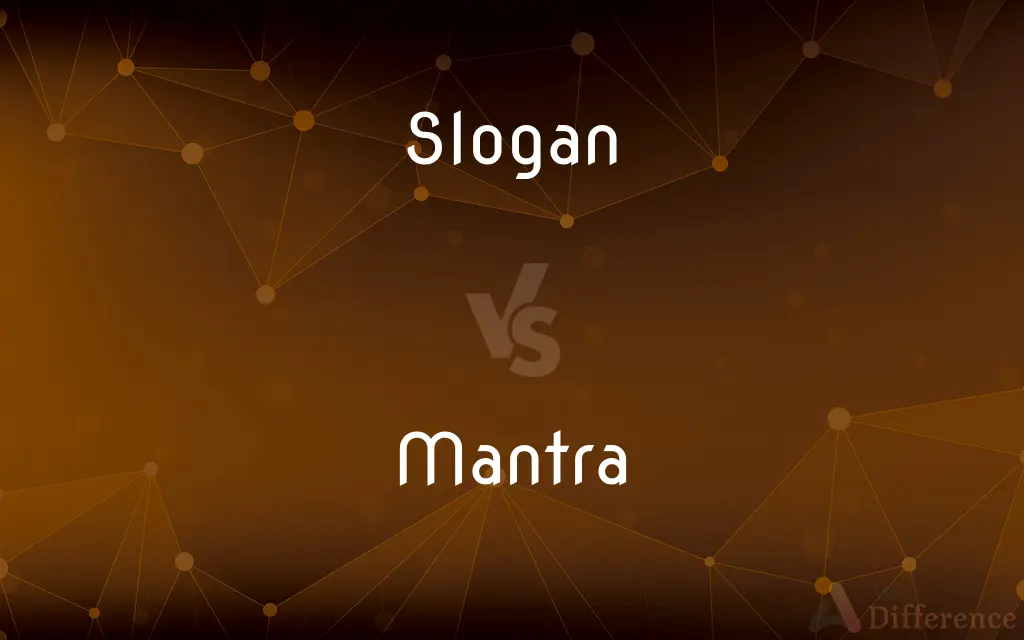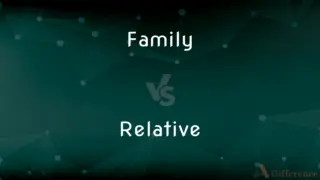Slogan vs. Mantra — What's the Difference?
By Urooj Arif & Fiza Rafique — Updated on March 25, 2024
A slogan is a catchy phrase for marketing, while a mantra is a spiritual or motivational guiding principle.

Difference Between Slogan and Mantra
Table of Contents
ADVERTISEMENT
Key Differences
A slogan is crafted to be memorable and persuasive, often used in advertising to highlight a brand or product's key benefit or feature. It's designed to resonate with the target audience and encourage consumer action. In contrast, a mantra is a sacred utterance, sound, or group of words believed to have spiritual power, often used in meditation or religious practices to focus the mind and promote a sense of peace or purpose.
Slogans are a staple in the marketing and advertising industries, changing frequently to adapt to new campaigns or market trends. Mantras, however, are timeless and personal, often repeated for life and used to maintain spiritual discipline or personal ethos.
While slogans are outward-facing, aimed at influencing public perception and driving sales or support for a cause, mantras are inward-focused, serving as a tool for personal growth, meditation, or spiritual practice. Slogans are designed to be public and shared widely, whereas mantras can be private, deeply personal affirmations or prayers.
The creation of a slogan involves market research, creativity, and strategic planning to ensure it aligns with brand messaging and appeals to the intended audience. The formulation of a mantra, on the other hand, might be rooted in ancient traditions, religious texts, or personal reflection, often passed down through generations or chosen through personal spiritual exploration.
Slogans are measured by their effectiveness in brand recall, consumer engagement, and sales conversion. The value of a mantra, however, is often gauged by its impact on an individual's mental, emotional, and spiritual well-being, without a commercial or external metric of success.
ADVERTISEMENT
Comparison Chart
Purpose
Marketing and advertising
Spiritual or personal guidance
Focus
External, public perception
Internal, personal growth
Change
Often changes with campaigns or trends
Generally timeless and consistent
Creation
Based on market research and brand messaging
Rooted in spiritual traditions or personal choice
Measurement of Success
Brand recall, consumer engagement, sales
Personal well-being, mental and emotional health
Compare with Definitions
Slogan
A short, catchy phrase used in advertising to convey a message about a brand or product.
Just Do It became a globally recognized slogan for Nike.
Mantra
Can serve as a personal affirmation or guiding principle.
Someone might adopt Live in the moment as a personal mantra to remind themselves to be present.
Slogan
Frequently used in political and social campaigns to summarize key points.
Vote for Change can be an effective slogan in political campaigns.
Mantra
Aimed at focusing the mind and promoting a sense of inner peace.
Repeating a mantra during meditation can help in achieving deeper concentration.
Slogan
Designed to be memorable and persuade consumers.
McDonald's I'm Lovin' It slogan aims to evoke positive feelings about their food.
Mantra
Valued for its spiritual significance and mental benefits.
The regular chanting of a mantra is believed to have calming and transformative effects.
Slogan
Can change over time to align with new marketing strategies.
Companies often update slogans to stay relevant with current trends.
Mantra
A sacred phrase, sound, or set of words in Sanskrit, used in meditation and spiritual practices.
Om Mani Padme Hum is a well-known Buddhist mantra for compassion.
Slogan
Plays a significant role in brand identity and consumer recall.
A good slogan can make a brand instantly recognizable.
Mantra
Often associated with specific spiritual or religious traditions.
Mantras are integral to practices in Hinduism, Buddhism, and other religions.
Slogan
A slogan is a memorable motto or phrase used in a clan, political, commercial, religious, and other context as a repetitive expression of an idea or purpose, with the goal of persuading members of the public or a more defined target group. The Oxford Dictionary of English defines a slogan as "a short and striking or memorable phrase used in advertising." A slogan usually has the attributes of being memorable, very concise and appealing to the audience.
Mantra
A mantra (Sanskrit: मन्त्र, romanized: mantra, ; Pali: mantaṃ) or mantram is a sacred utterance, a numinous sound, a syllable, word or phonemes, or group of words in Sanskrit, Pali and other languages believed by practitioners to have religious, magical or spiritual powers. Some mantras have a syntactic structure and literal meaning, while others do not.The earliest mantras were composed in Vedic Sanskrit in India.
Slogan
A phrase expressing the aims or nature of an enterprise, organization, or candidate; a motto.
Mantra
(Hinduism) A sacred verbal formula repeated in prayer, meditation, or incantation, such as an invocation of a god, a magic spell, or a syllable or portion of scripture containing mystical potentialities.
Slogan
A phrase used repeatedly, as in advertising or promotion
"all the slogans and shibboleths coined out of the ideals of the peoples for the uses of imperialism" (Margaret Sanger).
Mantra
A commonly repeated word or phrase, especially in advocacy or for motivation
"The mantra of solid-waste management has long been reduce, reuse, recycle" (Susan Freinkel).
Slogan
A battle cry of a Scottish clan.
Mantra
A concept or fact that is mentioned repeatedly, especially in advocacy
"Another mantra of housing bulls in America is that national average house prices have never fallen for a full year since modern statistics began" (Economist).
Slogan
A distinctive phrase of a person or group of people (such as a movement or political party); a motto.
Mantra
(Hinduism) The hymn portions of the Vedas; any passage of these used as a prayer.
Slogan
(advertising) A catchphrase associated with a product or service being advertised.
Mantra
A phrase repeated to assist concentration during meditation.
Slogan
(obsolete) A battle cry among the ancient Irish or highlanders of Scotland.
Mantra
(by extension) A slogan or phrase often repeated.
Slogan
The war cry, or gathering word, of a Highland clan in Scotland.
Mantra
A prayer; an invocation; a religious formula; a charm.
Slogan
A distinctive motto, phrase, or cry used by any person or party to express a purpose or ideal; a catchphrase; a rallying cry.
Mantra
A commonly repeated word or phrase;
She repeated `So pleased with how its going' at intervals like a mantra
Slogan
A favorite saying of a sect or political group
Mantra
(Sanskrit) literally a `sacred utterance' in Vedism; one of a collection of orally transmitted poetic hymns
Common Curiosities
What is a slogan?
A slogan is a memorable phrase used in advertising and marketing to convey the essence of a brand, product, or campaign.
What is a mantra?
A mantra is a sacred utterance, sound, or set of words used in meditation and spiritual practices to focus the mind and achieve spiritual growth.
Are mantras always religious?
While mantras have religious origins, they can also be secular phrases or affirmations used for personal motivation or meditation.
How are slogans created?
Slogans are created through a combination of market research, creativity, and strategic branding efforts to ensure they resonate with the target audience.
How is the effectiveness of a slogan measured?
The effectiveness of a slogan is usually measured by its impact on brand recognition, consumer engagement, and sales.
How do slogans differ from mantras in purpose?
Slogans are aimed at influencing public perception and behavior, typically for commercial or political purposes, whereas mantras are used for personal spiritual or mental well-being.
Can slogans change over time?
Yes, slogans often change with marketing campaigns or to adapt to new market trends, while mantras tend to remain consistent.
Can a slogan become a mantra?
In some cases, a slogan can become a personal mantra if an individual finds it particularly motivating or aligns with their personal values, though this is not its typical use.
What makes a mantra effective?
The effectiveness of a mantra is subjective and can be measured by its ability to aid in meditation, bring peace, or foster personal growth.
Why are slogans important in marketing?
Slogans are crucial in marketing for creating an easily remembered phrase that encapsulates the brand's message or value proposition, enhancing brand recall.
How do mantras contribute to meditation?
Mantras contribute to meditation by providing a focal point for the mind, aiding in concentration, and promoting a state of deep meditation or relaxation.
Who uses mantras?
Mantras are used by individuals engaging in meditation, spiritual practices, or those seeking a personal guiding principle or affirmation.
What role does a slogan play in a political campaign?
In political campaigns, a slogan succinctly conveys the essence of the campaign's message or goals, aiming to unify and mobilize supporters.
Can a mantra be in any language?
While traditionally in Sanskrit, mantras can be in any language, as long as the phrase holds personal or spiritual significance.
Is it necessary for a mantra to have a religious connotation?
No, a mantra does not need to have a religious connotation; it can be any phrase that holds personal meaning and aids in mental focus or well-being.
Share Your Discovery

Previous Comparison
Corridor vs. Aisle
Next Comparison
Family vs. RelativeAuthor Spotlight
Written by
Urooj ArifUrooj is a skilled content writer at Ask Difference, known for her exceptional ability to simplify complex topics into engaging and informative content. With a passion for research and a flair for clear, concise writing, she consistently delivers articles that resonate with our diverse audience.
Co-written by
Fiza RafiqueFiza Rafique is a skilled content writer at AskDifference.com, where she meticulously refines and enhances written pieces. Drawing from her vast editorial expertise, Fiza ensures clarity, accuracy, and precision in every article. Passionate about language, she continually seeks to elevate the quality of content for readers worldwide.













































